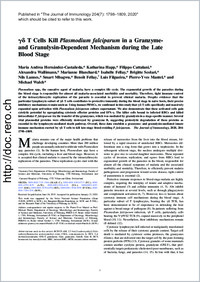γδ T cells kill Plasmodium falciparum in a granzyme- and granulysin-dependent mechanism during the late blood stage
- Hernández-Castañeda, Maria Andrea Anatomy Unit, Department of Oncology, Microbiology and Immunology, Faculty of Science and Medicine, University of Fribourg, 1700 Fribourg, Switzerland
- Happ, Katharina Anatomy Unit, Department of Oncology, Microbiology and Immunology, Faculty of Science and Medicine, University of Fribourg, 1700 Fribourg, Switzerland
- Cattalani, Filippo Anatomy Unit, Department of Oncology, Microbiology and Immunology, Faculty of Science and Medicine, University of Fribourg, 1700 Fribourg, Switzerland
- Wallimann, Alexandra Anatomy Unit, Department of Oncology, Microbiology and Immunology, Faculty of Science and Medicine, University of Fribourg, 1700 Fribourg, Switzerland
- Blanchard, Marianne Anatomy Unit, Department of Oncology, Microbiology and Immunology, Faculty of Science and Medicine, University of Fribourg, 1700 Fribourg, Switzerland
- Fellay, Isabelle Anatomy Unit, Department of Oncology, Microbiology and Immunology, Faculty of Science and Medicine, University of Fribourg, 1700 Fribourg, Switzerland
- Scolari, Brigitte Anatomy Unit, Department of Oncology, Microbiology and Immunology, Faculty of Science and Medicine, University of Fribourg, 1700 Fribourg, Switzerland
- Lannes, Nils Anatomy Unit, Department of Oncology, Microbiology and Immunology, Faculty of Science and Medicine, University of Fribourg, 1700 Fribourg, Switzerland
- Mbagwu, Smart Ikechukwu Anatomy Unit, Department of Oncology, Microbiology and Immunology, Faculty of Science and Medicine, University of Fribourg, 1700 Fribourg, Switzerland
- Fellay, Benoît Cantonal Hospital of Fribourg, 1752 Villars-sur-Glâne, Switzerland
- Filgueira, Luis Anatomy Unit, Department of Oncology, Microbiology and Immunology, Faculty of Science and Medicine, University of Fribourg, 1700 Fribourg, Switzerland
- Mantel, Pierre-Yves Anatomy Unit, Department of Oncology, Microbiology and Immunology, Faculty of Science and Medicine, University of Fribourg, 1700 Fribourg, Switzerland
- Walch, Michael Anatomy Unit, Department of Oncology, Microbiology and Immunology, Faculty of Science and Medicine, University of Fribourg, 1700 Fribourg, Switzerland
-
01.04.2020
Published in:
- The Journal of Immunology. - 2020, vol. 204, no. 7, p. 1798–1809
English
Plasmodium spp., the causative agent of malaria, have a complex life cycle. The exponential growth of the parasites during the blood stage is responsible for almost all malaria-associated morbidity and mortality. Therefore, tight immune control of the intraerythrocytic replication of the parasite is essential to prevent clinical malaria. Despite evidence that the particular lymphocyte subset of γδ T cells contributes to protective immunity during the blood stage in naive hosts, their precise inhibitory mechanisms remain unclear. Using human PBMCs, we confirmed in this study that γδ T cells specifically and massively expanded upon activation with Plasmodium falciparum culture supernatant. We also demonstrate that these activated cells gain cytolytic potential by upregulating cytotoxic effector proteins and IFN-γ. The killer cells bound to infected RBCs and killed intracellular P. falciparum via the transfer of the granzymes, which was mediated by granulysin in a stage-specific manner. Several vital plasmodial proteins were efficiently destroyed by granzyme B, suggesting proteolytic degradation of these proteins as essential in the lymphocyte-mediated death pathway. Overall, these data establish a granzyme- and granulysin-mediated innate immune mechanism exerted by γδ T cells to kill late-stage blood-residing P. falciparum.
- Faculty
- Faculté des sciences et de médecine
- Department
- Département de Médecine
- Language
-
- English
- Classification
- Biological sciences
- License
-
License undefined
- Identifiers
-
- RERO DOC 328481
- DOI 10.4049/jimmunol.1900725
- Persistent URL
- https://folia.unifr.ch/unifr/documents/308491
Statistics
Document views: 109
File downloads:
- pdf + supplementary material: 169
